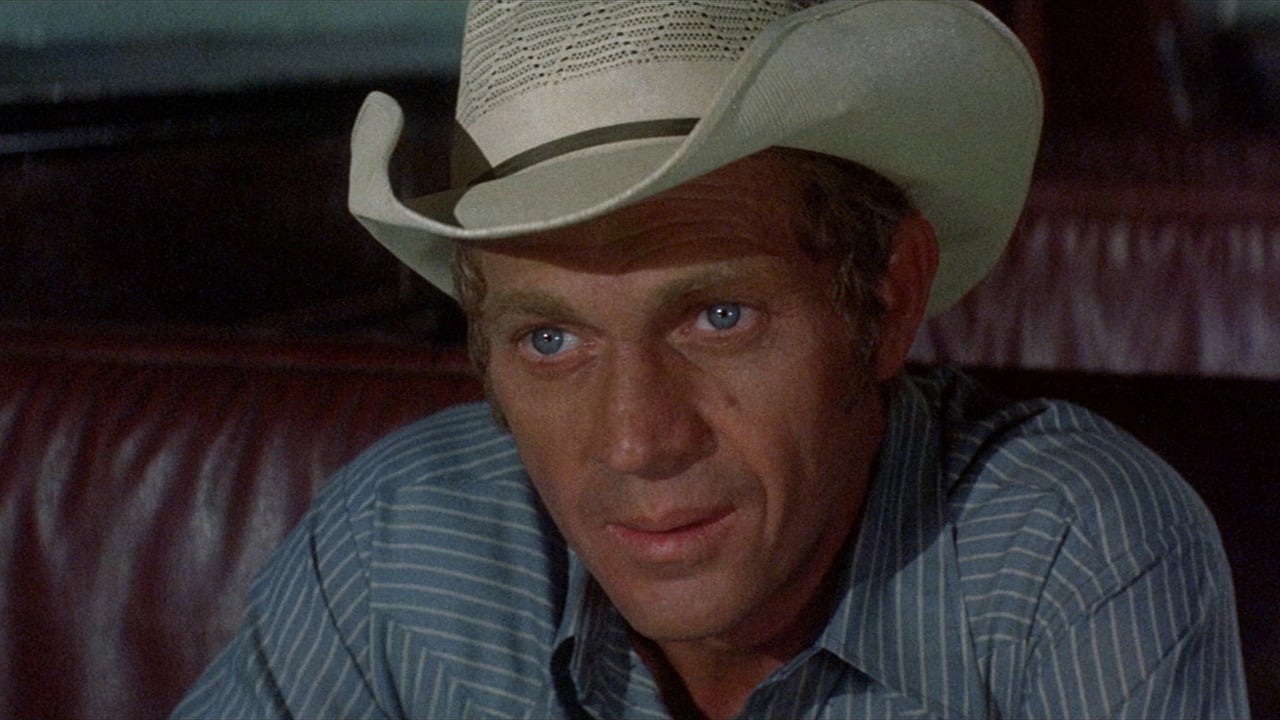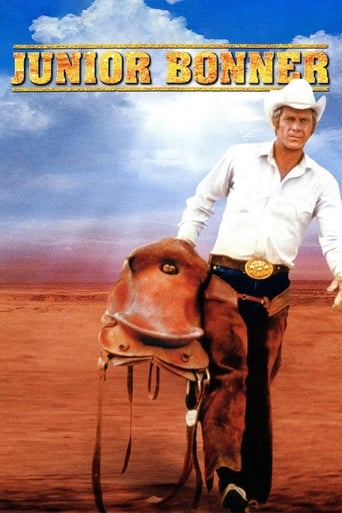



Surprisingly incoherent and boring
Too much about the plot just didn't add up, the writing was bad, some of the scenes were cringey and awkward,
View MoreIt’s fine. It's literally the definition of a fine movie. You’ve seen it before, you know every beat and outcome before the characters even do. Only question is how much escapism you’re looking for.
View MoreIt's a good bad... and worth a popcorn matinée. While it's easy to lament what could have been...
View MoreOn the surface, "Junior Bonner" has everything to please a fan of the New Hollywood period: from the panoramic shots of Arizonian landscapes to characters belonging to a dying breed, as to complete the authentic end-of-an-era feel. Movies like "Junior Bonner" resonate like tender and poignant eulogies to a certain idea of America, begging to be dusted off in our cynical money-driven days.And unsurprisingly, "Junior Bonner" comes from the most defining artisan of that era: Sam Peckinpah, the maverick director who borrowed from John Ford and Huston, before his very work would be revered as much as his glorious predecessors. Using his favorite setting, the Old West, and populating his films with true-to-life people, his movies poetically chronicled the struggle of men trying to play in old fields with the games' new rules. Their imminent exit, whether natural or not, is both an exhilaration and inspiration for us to express the most repressed appetites devouring our souls, before wisely leaving.What I just described now was the mindset while watching "Junior Bonner", the story of a rodeo player with a personal score to settle with the most dangerous bull of the show (a black one, naturally). The film opens with a sumptuously edited rodeo sequence concluding with Junior falling before the crucial eight seconds. I knew they'd meet again, but twenty minutes later, I had already forgotten about the bull and focused more on Junior's personal life in Prescott (Arizona) and the apparent dislocation of his family in which he plays the role of a passive observer. At that point, I just waited for him to get out of his laconic detachment and play a more active role, not that I didn't want to see his eventual triumph over the bull, but I didn't care.I didn't care because there were so many premises of great subplots in "Junior Bonner" but it seemed like Peckinpah was never quite sure in which field to play. Take one of his greatest trademarks: the editing, while it's pertinent for the first and last rodeo sequence (with a honorable mention to the stunt doubles who did a great job by hiding their faces from the camera), the same editing is randomly used in other parts such as a weird confrontation with a bulldozer destroying the house of Junior's father Ace, and an embarrassingly dizzying fight sequence in a bar. Over-edited or awkward are the most diplomatic word I can use.There is one scene though where Peckinpah's touch works. It happens during a 4th July celebration, when suddenly, both Junior and Ace (Robert Preston) gets on a horse and escapes from the parade to have a beer-driven father-and-son discussion in a deserted place. Some moments like that redeem the film, and God, I wished they were more. There was something in Preston's performance that reminded me of the character portrayed by Ben Johnson in "The Last Picture Show", Sam the Lion, and indeed, there was something of a lion, in that old coot of a man, mourning a vanished existence, and still holding his last hopes on his dream to emigrate in Australia, breed sheep and find gold like the good old days, as it's implied.Preston's revival of that Old West feel helps us to understand through the father, the son's personality. And while Preston alone could have carried the film, the film also shines from Ida Lupino's aura as Elvira, the struggling mother who accepted her husband's lust for women, and lack of responsibility and resigned to what life could offer us. Her constantly sad-looking eyes are those of a woman who suffered a lot, but without adversity drying heart out. And the pay-off of these two great performances, which would have been Oscar-worthy had the film been more ambition, occurs in the saloon scene where the flirtatious Preston confronts his ex-wife and can't refuse her the first dance. The chemistry between Lupino and Preston is so intense and believable, it almost make you forget this is a McQueen's film.And the family portrait is completed by the closest character to an antagonist, the brother Curly, played by Joe Don Baker who became a rich entrepreneur and real-estate agent. Curly embodies the destruction of the frontier spirit by capitalism, after it swept off the Native civilization, a redundant theme in Peckinpah's film. Curly could help both Bonner and Ace, financially, but we understand these men of honor would never surrender to the very system that destroyed their spirit. So many great themes the film tackles, but while we expect more human depth to come out of these interactions, the film gets back to its earlier point and doesn't leave our hearts much to be hooked on. "Junior Bonner" features some cool-looking shots and magnificent performances but for some reasons, Peckinpah didn't know whether it was a rodeo film or a family drama he had to male. That hesitation probably explains some weirdly inexcusable scenes, poorly directed from Bloody Sam' standards, a fight scene where you can see some extras laughing or possibly the most fake-looking punches in any film. The worst thing is not that the film is overly directed, sometimes, it's the total opposite. It's possible to enjoy McQueen's magnetic presence, the solid casting and the whole nostalgic atmosphere but not without ignoring these flaws. And it's a real shame that the film doesn't quite work, because Peckinpah could have assembled the two subjects. Rodeo could have been a way to show how cowboys' traditions became reduced to a bunch of crowd-pleasing games, instead of inserting that personal story with the bull, which sounded like an artificial plot device, with a predictable conclusion.It's just as if Peckinpah was in a rush to finish the film, as if his own material was like a bull trying to eject him. Sometimes, the film resist, sometimes it falls, and you can ever hear the buzzing.
View MoreMuch like The Ballad of Cable Hogue, Junior Bonner was released following a "typical" Sam Peckinpah film. Violence, terror, sexual intrigue and gritty realism dominated the style of Straw Dogs, but this film could not be more different. Starring Steve McQueen as an aging rodeo cowboy determined to continue the life he leads, the story takes place in Prescott, Arizona where it is the annual Fourth of July Rodeo Competition and JR is attempting to ride a bull he had previously fallen off. While in town, he runs into his family including his estranged parents, his successful real estate brother and a beautiful young woman he makes eye contact with at a bar. The real heart of the story, though, is the history of this somewhat dysfunctional family and their attempt to reconcile the past with the inevitable change of the future. Compared to his other works, this is a very lighthearted piece for Peckinpah, but he is still capable of eliciting wonderfully nuanced performances out of his actors as well as capture a nostalgic air about this subset of American culture that continues to try and stave off growing progress and technological advancements. If nothing else, Peckinpah continued to defy expectations of himself as a director by showing his full range of capabilities. No guns, no excessive blood or violence, no rape or psychosexual themes. Simply a story about a family dealing with realistic issues. It may not be one of his strongest achievements, but it is definitely Peckinpah.
View MoreThe film itself is interesting enough, even to those not interested in its core subject of Rodeo, and it's a story that I think most viewers can get onside with. The title character played wonderfully by Steve McQueen returns to his home town of Prescott, Arizona, to find that the family he left behind is now fractured and that age has caught up with him and his Rodeo life.It's a very up and down piece that on the surface doesn't seem like a directed effort from Sam Peckinpah. But there's some very special treats in the film to look out for. I have never been to a Rodeo so I have no frame of reference as regards the power of the Rodeo scenes here, but they certainly hit the spot of this particular viewer, in fact, I was transfixed by them. The film is also dotted with interesting and nicely drawn characters that are thankfully well realised by the acting talent on show. Ida Lupino, Robert Preston & Ben Johnson all help to keep the film way above average, but ultimately it's Steve McQueen turning in a memorable lead performance that actually deserves a better film than the one it ends up being. So 7/10 for the film as a whole, but a genuine 10/10 for the affectingly deep turn from McQueen.
View MoreThis is a really odd film directed by Sam Peckinpah. While there is an almost cult-like aura about him by his fans, this film may upset many of the "Peckinpah-sters" who are expecting the usual Peckinpah style. In essence, the violence is practically gone--no one is killed in the film and the amount of blood shed is very little--though there are a few of the trademark slow-motion shots. In addition, the film is set in the West, somewhat of an obsession for Peckinpah, but in the modern age.The story is about an aging rodeo star whose better days are far behind. Now he's broke and coming back to visit his home town. The narrative is far from traditional, as not a whole lot really occurs in the film--instead it's like a slice out of the life of the leading man (Steve McQueen) during this small time period of just a few days. Instead, you learn about his rather dysfunctional family--his father (who was also a rodeo star long ago) who STILL needs to grow up, his greedy brother and his long-suffering (and a bit stupid) mother. None of these characters are particularly likable and it's all a bit sad, though it also does seem rather true-life as well. The characters, though horribly flawed, are much more real than you'd find in other films. Too bad, however, that they never do much of anything.Overall, a very slow-moving film that was obviously a labor of love for the director but which probably won't appeal to most people. Yes, it's a realistic portrait of a strange piece of Americana, but many just won't find much reason to see it--not that it's bad, mind you, it just never rises above the level of "meh...". Still, not a bad little film.
View More